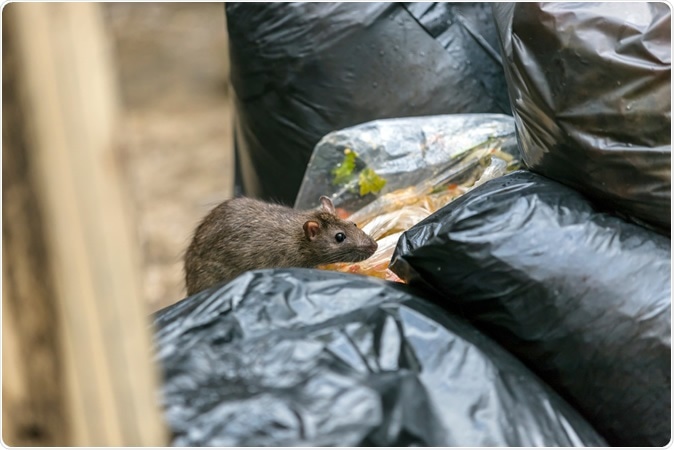The Centre for Disease Prevention and Control (CDC) has warned that as restaurants are closed due to social distancing and lockdowns owing to the COVID-19 pandemic, rats are resurfacing en masse. The CDC warns that these rats are becoming aggressive as they are deprived of their usual source of food.
The COVID-19 pandemic and its consequences
The world has been gripped for the past few months with the COVID-19 pandemic caused by the highly infectious severe acute respiratory syndrome coronavirus 2 (SARS-CoV-2)that causes severe acute respiratory distress syndrome (ARDS) and COVID-19 disease. Due to the highly infectious nature of the virus that allows it to spread rapidly between person to person, social distancing, and frequent hand washing is advised. While washing hands and cleaning frequently-touched surfaces with soap and water can help protect from the virus, social distancing can prevent person-to-person spread to a greater degree says the World Health Organisation (WHO). Social distancing requires keeping a minimum distance of six feet between individuals. Scientists have advised breaking the chain of transmission by asking people to stay indoors and avoid gatherings.
People the world over are encouraged to work from home and generally stay at home as much as possible to prevent transmission of the virus. Over the past couple of months most countries have exercised these lockdown norms, and most restaurants and eateries have been shut down to limit gatherings and, therefore, the spread of the infection. Those that are open have seen a marked reduction in sales.
Rats and restaurants
Rodents mainly rely upon food scavenged from leftovers and bins around eating joints. With the lockdowns and lowered sales of the restaurants, the source of food for these rats have been markedly diminished.

Image Credit: Chanawat Phadwichit / Shutterstock
CDC warning this week
Due to the lack of food, most of the rodents have become more aggressive, says the CDC in a warning issued this week. They have said that in New York and other major U.S. cities, there has been rising rat cannibalism since the start of the pandemic. Chicago and New Orleans have seen on camera, an army of rats on streets. In the District of Columbia, pest control received over 800 calls last month over rodent problems. The CDC fears that since rodents carry the risk of several infectious diseases such as plague, listeria, salmonella, and other bacterial infections, this could spell a spur in these cases. Their urine and stool can also aggravate asthma and other respiratory allergies. Rats are also well-known pests damaging household items, tubings, pipes, car tires, engines, etc. These also raise the risk of fires, say experts.
Recommendations
The organization has also issued recommendations to combat this menace. They advise homeowners and business owners to keep their garbage cans covered to prevent rats from accessing them. They also advise putting pet and bird foods out of reach of rodents and sealing up of all the rodent holes. The agency says that rodent-borne diseases could be avoided if advisories are followed carefully.
The advisory says, “Follow established guidelines when cleaning up after rodent infestations to prevent exposure to rodent-borne diseases. Fleas are common on rodents. In the area of heavy rodent infestations, workers should consider using a repellent registered by the US Environmental Protection Agency…”
Expert speak
A warning regarding the rise in rats was put out in late March by rodentologist Bobby Corrigan, who had predicted this problem that would occur due to closure of restaurants as the pandemic began. He warned that with the lack of their usual source of food, they would invariably turn on each other. Leaving food around the house unattended or leaving garbage cans open could mean an invasion of rats in and around the homes. This could be dangerous say experts. Mr. Corrigan called rats “opportunistic foragers” and said that this is the predicted behavior of rodents in cities. Stopping them from accessing food around the house is the most important measure, he says.
“Jurisdictions have closed or limited service at restaurants and other commercial establishments to help limit the spread of COVID-19,” the CDC said. “Rodents rely on the food and waste generated by these establishments. Community-wide closures have led to a decrease in food available to rodents, especially in dense commercial areas.” “Some jurisdictions have reported an increase in rodent activity as rodents search for new sources of food. Environmental health and rodent control programs may see an increase in service requests related to rodents and reports of unusual or aggressive rodent behavior,” the statement added.